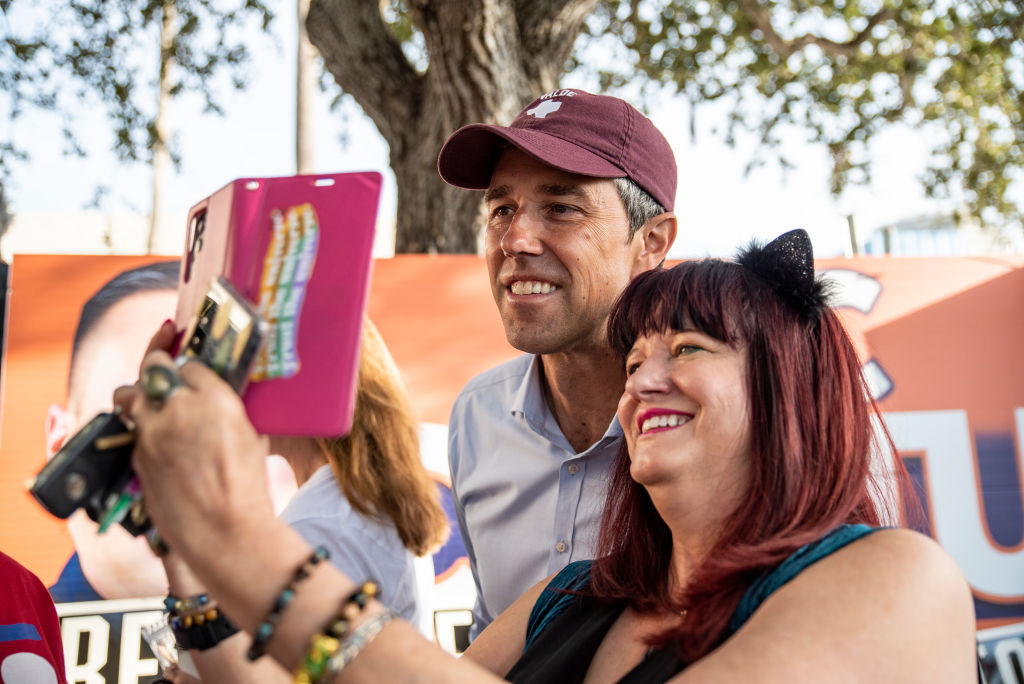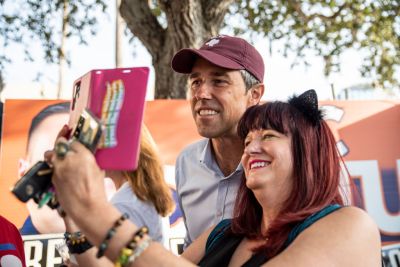Democratic Govs. Laura Kelly and Tony Evers spent Tuesday evening celebrating hard-fought reelection battles. Both incumbent governors won narrow victories in their respective ruby-red Kansas and purplish-Wisconsin, proving Democrats can win statewide elections in competitive states.
Despite their success, Kelly and Evers don’t exactly top the list of notable Democratic political figures today. But two who do, Beto O’Rourke and Stacey Abrams, have raked in millions in donations and gobs of national media attention, even though they’ve lost multiple ticket-topping races.
Why have Democrats continue to prop up candidates like them, whose only real political pedigree is losing previous elections? It’s complicated.
O’Rourke, the former El Paso congressman, lost to two-term Texas GOP Gov. Greg Abbott on Tuesday by roughly 11 points in a race in which his odds were always long: Democrats haven’t won a Texas gubernatorial election since 1990.
O’Rourke’s rout follows his 2018 Senate loss to Sen. Ted Cruz—for which he raised an eye-popping $80 million and came within two points of ousting his Republican opponent—and a quickly fizzling run for president in 2019 that ended before primaries kicked off. Among the three failed bids he tossed more than $160 million in campaign donations down the drain.
Yet he still soaked up celebrity, and a quote in a 2019 Vanity Fair profile has come to define his political career: “I want to be in it. Man, I’m just born to be in it.” That sentiment bled into O’Rourke’s concession speech Tuesday evening, in which he suggested he has no plans of giving up on his political ambitions. “I don’t know what my role or yours will be going forward, but I’m in this fight for life.”
Part of the all-sizzle-no-steak dynamic for O’Rourke comes because he’s just not a strong candidate, despite his near-miss against Cruz in 2018. “Democrats are like, ‘We want Beto to win!’” said Democratic pollster Stefan Hankin. “Great, I want Beto to win too. It’s probably not going to happen, and we kind of knew that from the beginning. But we’re gonna spend a ridiculous amount of money for Beto to fail, and we’re gonna walk away the second after he’s done.”
Georgia voters have seen the same with Abrams. Riding the high of her narrow loss to Republican Gov. Brian Kemp during the 2018 midterm cycle—a loss she refused to concede—Abrams took on Kemp again in a year that looked far less favorable to Democrats. Her second loss to Kemp was by more than 7 points, despite her raking in more than $85 million in campaign donations as of early October.
This year’s loss frustrates Democrats all the more since Georgia has turned purple since her first run (for which Abrams likely deserves much credit). But much like O’Rourke, even Tuesday’s election results might not dissuade Abrams—who earned her celebrity status in large part because she refused to concede defeat in 2018—from seeking statewide office again in the future. “While I may have not crossed the finish line, that doesn’t mean that I won’t stop running for a better Georgia,” she told supporters in a Tuesday evening concession speech.
Democratic operatives say such dead-end candidacies are a result of the party’s fundraising culture. The left has owned the small-dollar fundraising game since the creation of digital pay-processing firm ActBlue in 2004—15 years before Republicans launched their counterpart, WinRed.
For more than a decade Democrats have used fundraising gimmicks like fundraising thermometers and countdown clocks that ramp up donor enthusiasm. But such tactics also encourage donors to fixate on unwinnable races rather than invest in down-ballot contests that could lead to long-term grassroots success.
Consider the 2020 election cycle. Smelling blood in Republican waters while trying to unseat former President Donald Trump, Democrats also targeted then-Senate Majority Leader Mitch McConnell. Donors poured more than $90 million into the campaign of his opponent Amy McGrath—whose only political experience includes losing a House race—in deep-red Kentucky. She outspent McConnell by more than $20 million and still lost by 20 points.
Democrats launched similar multimillion-dollar fundraising operations the same year against Lindsey Graham in South Carolina, Roger Marshall in Kansas, and Joni Ernst in Iowa. All of them failed.
What gives? “The Pavlovian response among a particular subset of Democrats was anytime you see something or retweet something that makes you mad, that bell rings and that salivation response is giving $10 or $20,” GOP lobbyist Liam Donovan said in a recent interview. Democrats tried to take down McConnell “not because he’s beatable, but because: ‘Mitch McConnell makes me mad and I’m going to make myself feel better.’”
Successful Democrats say instead of impulse gifts to celebrity candidates, donors should think smaller.
“We gotta till the soil more in areas that need extra nurturing,” former Sen. Doug Jones, the first Democrat to win a Senate race in Alabama in 25 years, said in an interview Tuesday.
“Democrats have trained their donors to give to candidates in an election cycle—and we go from one election cycle to the next with candidates,” Jones continued. “They have not trained their donors the way I think Republicans have done for the last 30 or 40 years, and that’s to play the long ball.”
As Jones sees it, that means supporting grassroots efforts to elect Democratic candidates in local races for school board, city council, and state legislature.
But that may mean breaking the habits that have fueled Democrats’ small-dollar game for years. “We have this system of funding elections that relies on individual donor preference, and it’s just kind of the way the ball bounces,” said Howard Wolfson, a Democratic strategist who previously served as a spokesperson for Hillary Clinton during her 2008 presidential bid. “Sometimes people will be attracted to candidates who don’t necessarily have as good a chance as others, but they’re clearly doing something to attract interest.”
Others maintain party leaders can address the problem by encouraging rising Democratic stars to emulate the campaign strategies of lower-profile members of their party who have a proven track record of winning statewide elections in red-leaning states. Think Democratic Govs. John Bel Edwards in Louisiana, Roy Cooper in North Carolina, or now Kelly in Kansas and Evers in Wisconsin.
The question is, coming off a better-than-anticipated midterm, will Democrats consider all this. Hankin, the Democratic pollster, isn’t optimistic: “Since we had a better night than expected everyone will feel good and learn no lessons.”







Please note that we at The Dispatch hold ourselves, our work, and our commenters to a higher standard than other places on the internet. We welcome comments that foster genuine debate or discussion—including comments critical of us or our work—but responses that include ad hominem attacks on fellow Dispatch members or are intended to stoke fear and anger may be moderated.
With your membership, you only have the ability to comment on The Morning Dispatch articles. Consider upgrading to join the conversation everywhere.